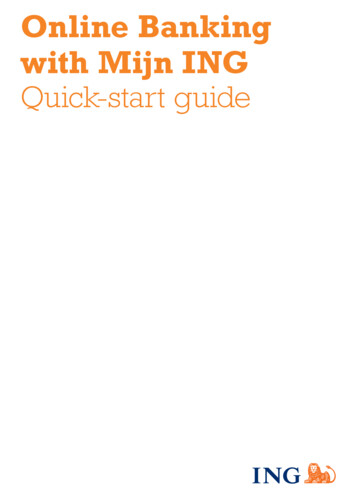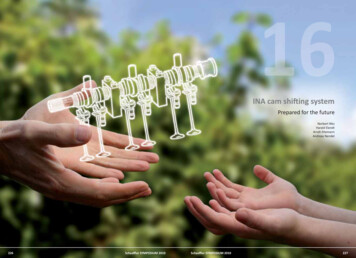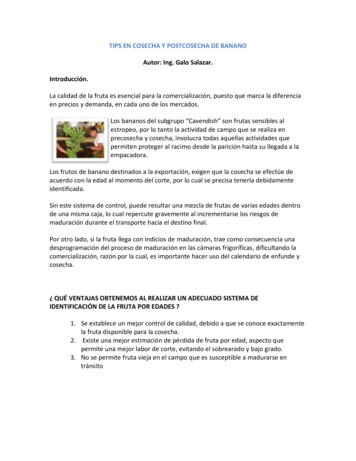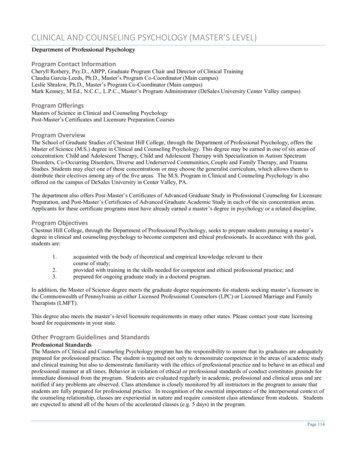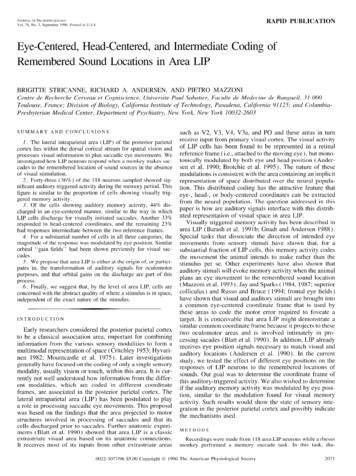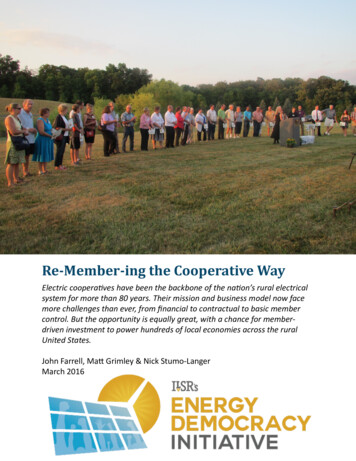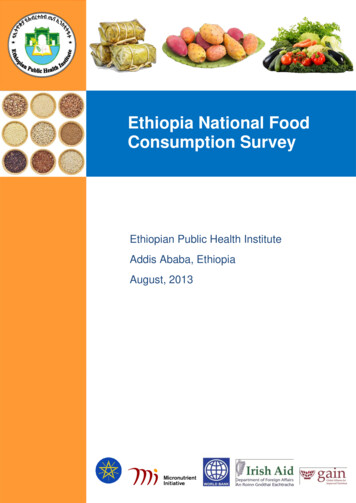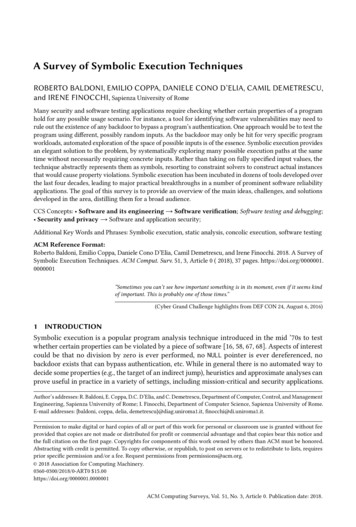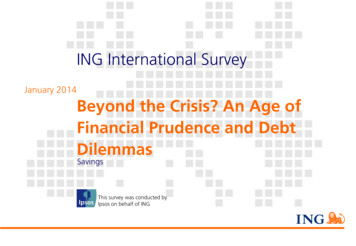
Transcription
ING International SurveyJanuary 2014Beyond the Crisis? An Age ofFinancial Prudence and DebtDilemmasSavingsThis survey was conducted byIpsos on behalf of INGING International SurveyBeyond the Crisis? An Age of Financial Prudence and Debt Dilemmas (January 2014)
Table of contentsAbout the ING International Survey 3Executive summary 4Infographic 5Global financial crisis still haunting savers 6› Stress on savings linked with economic growth› Borrow or spend? Not so much since the crisis› Splash out on luxuries? Not likely, as majority trim their spending› Situation improving – but many struggling in economic climate› Luxembourg tops the “savings comfort” league, Romania last› About one-in-three don’t have any savingsSpotlight on “emergency funds” 13› Alarming shortage of emergency funds› Top savings goal: Emergency funds› Relying on credit in an emergency?Responsible borrowing and dangerous debt dilemmas 17› Borrowing money common across Europe› Credit card debt dominant in UK; bank loans in Italy› Borrowed from loved ones? Secretive spending rises› Too many don’t know how much they owe› PhD graduates also unaware how much they borrowed› Failing to pay expensive debt quickly?Contact details 24Disclaimer 252ING International SurveyBeyond the Crisis? An Age of Financial Prudence and Debt Dilemmas (January 2014)
THE SURVEYAbout the INGInternational SurveyThe ING International Survey aims to gain abetter understanding of how retail customers –and potential customers – of ING Bank aroundthe globe spend, save, invest and feel aboutmoney. It is conducted several times a year,with past reports online atwww.ezonomics.com/iis.This survey was conducted by Ipsos between24 October and 14 November 2013 usinginternet-based polling techniques.European consumer figures are an average,weighted to take country population intoaccount.13countries are compared in thisreport.1,000About 1,000 respondents weresurveyed in each, apart fromLuxembourg, with 500.12,637is the total sample size ofthis report3ING International SurveyBeyond the Crisis? An Age of Financial Prudence and Debt Dilemmas (January 2014)
EXECUTIVE SUMMARYDicing with debt and still reluctant to spend inrecovering EuropeThe third annual ING International Survey on Savings throws the spotlight on the state of savings inEurope, how prepared people are for a financial emergency and how they are managing debt.1. The ING International Survey on Savings 2014finds the uneven recovery from the globalfinancial crisis in different parts of Europeappears to be echoed in an uneven level ofcomfort with savings. Luxembourg rises to thetop of the comfort savings league in 2014, whileRomania fills last spot. Italy – at the bottom of thetable for the last two years – has managed to riseone place.2. Spending is still under pressure, with only22% of the almost 13,000 people surveyed inEurope saying they have not cut back. Askedexplicitly if they are more reluctant to spendmoney since the global financial crisis, almost twoin-three agree that they are. Even more agree thatthey are more reluctant to borrow in the post-crisisenvironment.3. There is an alarming shortage of emergencysavings funds – which are widely considered asessential for healthy personal finances. However, itis heartening to see an emergency fund is the mostpopular savings goal in Europe in general andcomes top in 11 out of the 13 countries surveyed.4. Responsible borrowing – whether through apersonal loan from a bank or family member, orvia an overdraft, credit card, student loan or cardealer – is a routine part of managing money formany people. The section of the survey thatexamined debt raises some serious warningsigns. For example, 18% of people with debt(excluding a mortgage) do not know how muchthey owe. Even highly educated borrowers, such asthose with a PhD, are only slightly less likely to notknow how much they owe. The lack of awarenessof this basic piece of personal finance knowledge isstartling.4ING International SurveyBeyond the Crisis? An Age of Financial Prudence and Debt Dilemmas (January 2014)5. Types of borrowing varies from country-tocountry, with personal loans particularly popularin Luxembourg and credit card debt featuringfrequently in the United Kingdom.6. Loans from family or friends are the fourth mostcommon source of debt in the survey. But thesurvey suggests this carries the risk of differentstresses and penalties, as 30% of people whohave borrowed from friends and family havealso hidden a purchase from their loved onesin the last year.- Ian Bright, ING senior economist
INFOGRAPHICFour dangerous debt dilemmasResponsible borrowing – whether through a personal loan from a bank or family member, or via an overdraft, creditcard, student loan or car dealer – is a routine part of managing money for many people. But, running a householdbalance sheet can raise challenges. The third annual ING International Survey on Savings asked almost 13,000 people in13 countries in Europe If they have debts (excluding a mortgage) and how they are managing them.5ING International SurveyBeyond the Crisis? An Age of Financial Prudence and Debt Dilemmas (January 2014)
Global financial crisis still haunting savers6ING International SurveyBeyond the Crisis? An Age of Financial Prudence and Debt Dilemmas (January 2014)
GLOBAL FINANCIAL CRISIS STILL HAUNTING SAVERSTHE QUESTIONStress on savings linkedto economic growthCountries in Europe are recovering from the global financialcrisis at an uneven pace and this appears to be echoed forpeople in Europe in many responses in the survey.Gross domestic product (GDP) is one way to measure thestrength of an economy.We see Italy had the largest fall in GDP year-on-year of allcountries surveyed – and the largest share in the survey sayingsavings declined in the last year.On the flipside, Turkey had the fastest GDP growth and thesmallest share whose savings declined in the last year.This seems to demonstrate a correlation between weakness inthe wider economy and the pressure being put on the stockpileof savings people have managed to accumulate.How did your savings develop in the last year?Percent who answered “it declined” and the year-on-year change in gross domesticproduct (GDP) to the end of June 2013Savings declinedGDP changeTurkey26%4.4%United d32%0.8%Czech .6%Italy58%-2.2%7ING International SurveyBeyond the Crisis? An Age of Financial Prudence and Debt Dilemmas (January 2014)
GLOBAL FINANCIAL CRISIS STILL HAUNTING SAVERSTHE QUESTIONBorrow or spend? Notso much since the crisisThe global financial crisis appears to have had a lasting impacton attitudes to both spending and borrowing money.More than two-thirds – or 69% – of European consumers agreethey are more reluctant to borrow money since the crisis, withpeople in Romania, Czech Republic, Spain, Poland and Italyparticularly wary.There is also a widespread rise in caution around spendingmoney since the crisis began. Again, large numbers of people inSpain and Italy are more reluctant to spend – along with peoplein France.“I am more reluctant to borrow/spend money since theglobal financial crisis”Percent who answered “strongly agree” or “agree”More reluctant to borrowEuropean TurkeyUnited KingdomFranceItalyPolandSpainCzech RepublicRomania8ING International SurveyBeyond the Crisis? An Age of Financial Prudence and Debt Dilemmas (January 2014)More reluctant to 62%70%74%74%76%74%52%76%80%76%66%79%65%
GLOBAL FINANCIAL CRISIS STILL HAUNTING SAVERSSplash out on luxuries? Not likely, asmajority trim their spendingMany people have cut the amount of money they are spending in response to economic conditions.Overall, only 22% of people in Europe say they have not had to cut back. When asked which areaswere being cut, the top five most commonly cited areas are:12345Leisure andentertainment (such asgoing to the cinema ordining out) was the mostcommonly cited area inwhich people in Europehave cut back, givencurrent economicconditions.It was top in 11 out of the13 countries in the survey.Clothing and groomingwas the second mostcommon area to cut backfor people in Europe.In two countries (Polandand Turkey) it was actuallya more common area to cutspending on than leisureand entertainment.Women, in particular, havecut back on clothing andgrooming costs, with 57%saying they have comparedwith 39% of men.A holidays was the thirdmost common area inwhich people in Europehave cut spending.Food was the fourth mostcommon area to be cutback.It was in the top five forevery country in the surveyexcept Romania and Turkey.Again, women wereparticularly likely to say theyhad cut back on theamount they spend on food– with 33% saying they didthis compared with 26% ofmen.Housing – includingfurnishing and maintenancecosts – was the fifth mostcommon area in which tocut spending.However, it was not in thetop five for four countries inthe survey (Belgium,Germany, Spain and theCzech Republic), whereutility bills or mobile phonesand internet costs weremore frequently cited.9ING International SurveyBeyond the Crisis? An Age of Financial Prudence and Debt Dilemmas (January 2014)
GLOBAL FINANCIAL CRISIS STILL HAUNTING SAVERSTHE QUESTIONSituation improving –but many struggling ineconomic climateIn 10 of the 13 countries surveyed, fewer people comparedwith this time last year are saying the current economicsituation has led to a deterioration in their finances. Spain, inparticular, has a “recovery” in the share saying the economyhas caused their finances to deteriorate. So while Spain is in thetop three highest, the situation there appears to have improvedgreatly in the last year.France and the Netherlands are the standout exceptions to thispicture of improvement. In these two countries alone, the sharesaying the economy has caused their finances to deteriorate hasincreased.The response in Poland is unchanged year-on-year.How has the current economic situation affected yourfinances during the past three months?Percent who answered “deteriorated” or “deteriorated greatly”2014 survey2013 survey41%44%European consumerLuxembourgGermanyAustriaTurkeyCzech RepublicUnited taly10ING International SurveyBeyond the Crisis? An Age of Financial Prudence and Debt Dilemmas (January 37%38%47%42%53%52%46%55%64%58%59%
GLOBAL FINANCIAL CRISIS STILL HAUNTING SAVERSTHE QUESTIONLuxembourg tops the“savings comfort”league, Romania lastFor the last three years, respondents to the ING InternationalSurvey on Savings have been asked how comfortable theyare with the amount of money they have in savings – aquestion that taps into feelings around money.Luxembourg tops the league table this year with the highestproportion saying they are very comfortable or comfortablewith the amount they have in savings, up two places fromthird in the savings comfort ranking last year.The biggest positive movers are France and the CzechRepublic, both up three places.The biggest fall is Germany, slipping four.To what degree are you comfortable about the amountyou have available in savings?Countries ranked by percent who answered “very comfortable” or “comfortable”201220132014Luxembourg131 2Netherlands2 12-1Austria643 1United Kingdom964 2Turkey1155 Germany426-4Belgiumnot available77 France8118 3Spain789-1Czech Republic1013 10 3Poland2 911-2Italy13 13 12 1Romania51013-311ING International SurveyBeyond the Crisis? An Age of Financial Prudence and Debt Dilemmas (January 2014)Change (2013-14)
GLOBAL FINANCIAL CRISIS STILL HAUNTING SAVERSTHE QUESTIONAbout one-in-threedon’t have any savingsAbout one-in-three people in Europe say they do not have anysavings – a share that has changed little since the 2013 survey.However, the overall landscape has slightly deteriorated as eightof the 13 countries surveyed had a rise in the share saying theydid not have savings.Moreover, looking at the country-by-country figures, there aresome significant changes. In Poland and Italy, for example, thenumber of people without savings rose sharply.In the Czech Republic, the share of people saying they do nothave savings fell greatly year-on-year.Do you have any savings?Percent who answered “no”2014 surveyEuropean consumerLuxembourgNetherlandsAustriaFranceUnited KingdomCzech a12ING International SurveyBeyond the Crisis? An Age of Financial Prudence and Debt Dilemmas (January 2014)2013 %30%30%28%31%29%33%26%39%28%40%39%48%48%
Spotlight on “emergency funds”13ING International SurveyBeyond the Crisis? An Age of Financial Prudence and Debt Dilemmas (January 2014)
SPOTLIGHT ON “EMERGENCY FUNDS”THE QUESTIONAlarming shortage ofemergency funds“If my income fell a lot, I have enough money in savings tosupport my current spending for three months”It’s important to have a financial buffer to use when fortunestake a difficult turn. Known as “emergency funds” or “rainyday savings”, personal finance experts typically recommendamassing three-to-six-months of take home pay. The exactfigure varies for personal circumstances (such as havingdependents or having certain insurances).But 39% of people in Europe disagree that they have enoughmoney saved to support their current level of spending for threemonths, if their incomes fell a lot.The share rises to more than half in France and Romania.As we have seen earlier in the report, economic conditions arestill difficult for many savers and this may be a factor behindthe shortage of emergency funds.European consumerPercent who answered “strongly disagree” or s32%Turkey32%United Kingdom33%Czech Republic
Responsible borrowing – whether through a personal loan from a bank or family member, or via an overdraft, credit card, student loan or car dealer – is a routine part of managing money for many people. But, running a household balance sheet can raise challenges. The third annual ING International Survey on Savings asked almost 13,000 people in


